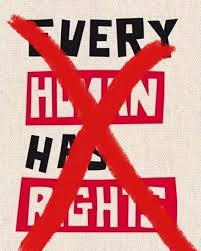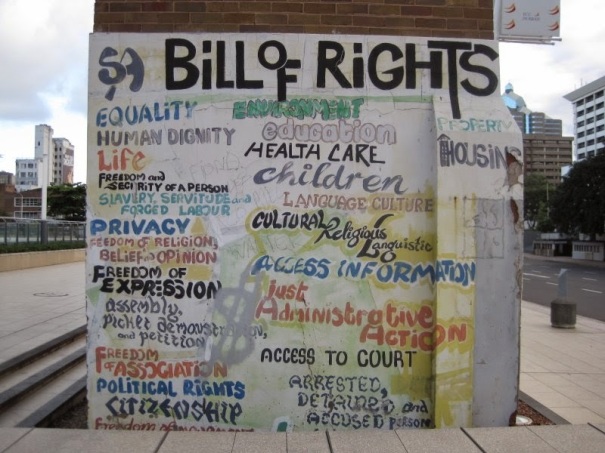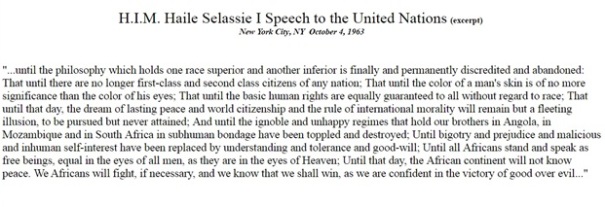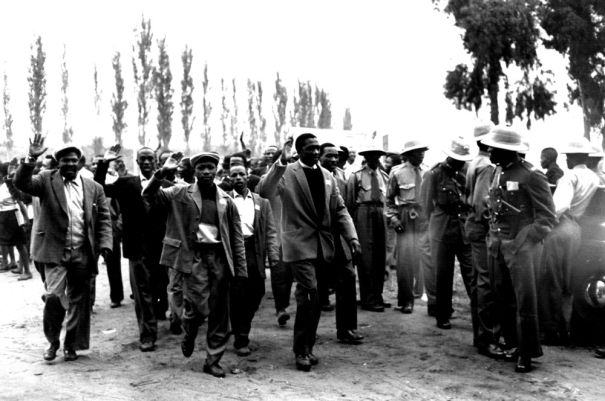
Image source: https://encrypted-tbn2.gstatic.com/imagesq=tbn:ANd9GcRtrB114n3PQZX5v0gN2krtPMINYeM5Z6cPP9F_ubDWCzt9noJm
By The Good Elephant
Prior to our president exercising his constitutional right to fire and appoint ministers, South Afrca celebrated Human Rights day on the 21st of Mrach. It is because of that day that I can’t help but ask myself these questions; what are rights? Do we as Africans, being the vast majority of this land, have rights? What does one need in order to qualify for these rights? Are rights meant for everybody? Who is a Human? These are but the few questions that always come to mind whenever this day comes. As always, routinely, the government celebrates this day by choosing a place where central festivities are going to be held, they proclaim these rights upon all South Africans, joyfully enjoy themselves and go home to live another day. Interesting events occurred though in this years celebrations but I shall tackle this towards the end of the article.
When one deeply interrogates the Bill of Rights, which is Chapter 2 of South Africas constitution, knowing full well, the premise on which this country was built, you tend to experience a deep unsettling feeling within yourself. The question that mostly stems up with this feeling is that of “can there ever be a true application of Human rights without a correction of pasts imbalances?” “Can Rights ever be attainable to every human being without prior justice?” You might wonder why I choose the words “attainable & application” to a construct such as Human rights, something supposed to be accessible to everyone born into this earth. Well that’s because human rights as a construct are human developed, human protected and human given. Hence they are called human rights, that’s because humans preside over them. In a system designed by human beings, with institutions thought of, built and ruled by human beings, they determine who does and who does not have a right with regards to that system. Before I elaborate on this point using examples, lets here George Carlins take on Human rights.
“There are no Rights, there are only Temporary privileges” is the statement that pushes me to use such words as attainable, application & accessible when talking about Human rights, simply because they are priviledges. What does this mean then for an African being living in a country whos past still affects social interactions even today? What does this mean for a landless, destitute, dispossessed African supposed to find being in a capitalistic society that only serves the ruling elite and their true masters, the architects of this country? It can only mean one thing, “You have a right too……Only if you can afford it.” This is why you have a constitution that says “You have a right to education….” But the system in which this constitution is meant to exist says “going to school is a Priviledge”. Water is life and the constitution says that SA citizens have a right to life, how then does a country sell bottled water but fail to provide many of its citizens with clean drinking water if lack of access to water is an impediment on ones right to life?
By embracing the fact that Human rights as a construct are in actual fact privileges, we all know from our experiences with White privilege that some things are therefore only available for some races or classes in society. For instances, in a system like ours which is European centred in both its architect and mannerisms, many privileges are only available to white people, whom make up the bulk of our upper class. Private schools, private hospitals, Eurocentric curriculums, European cultured way of doing business, land, economic means etc etc. compare this to landless Africans who have to contend with structural racism on a daily and the fact that many Human rights proclaimed over every South African passport carrying individual are not available to them. Isn’t it baffling that some people within the same society have the Priviledge of having butt cleansing toilets whilst many others have been denied the right to clean water? This is when you realise that something is wrong with this society. Makes you wonder if those whom rights/privileges are denied, are considered as Human or not, a phenomena we were dealing with recently as Africans.
I do want to make one thing clear, rights/privileges are a very much needed charter for human beings, for they should be the foundation of every human interaction, at all levels. It is why we celebrate such acts as the “Declaration of the Rights of the Negro Peoples of the World” drafted by a 25000 strong African men and women delegation in 1920, as led by Marcus Garvey and the Universal Negro Improvement Association. All humans being equal in front of the law, having the same exact opportunities and means to explore those opportunities, rights/privileges can only help the situation. However when rights/privileges are not readily nor easily attainable by the lowest of us, then that is a sham and needs to be corrected.

Image source: http://blog.leebobblack.com/2010/12/south-african-bill-of-rights-durban_28.html
Let us take some time to explore the Bill of Rights just so as to put the above narration into context. Without writing a very lengthy article that interrogates each right that the Bill proclaims, I see it fit to interrogate the core and crux of what the Bill says it provides, i.e. the democratic values of Human dignity + Equality + Freedom = Life.
Human Dignity
All humans have the right to dignity but what dignity can a landless, dispossessed and destitute African majority hope to possess in such a society? Human dignity stems from a human beings state of being. Being landless means no place to call home, no place to build, no place to lay the dead in a dignified manner, no place to plant and feed ones family. What dignity do we think people who always get evicted from pieces of land have when they were just trying to get a roof over their heads? What dignity do we think young girls have when they have to miss school due to periods? What dignity do we think the people of Marikana have when after uprooting their lives from their birth places, came to the platinum belt to search for a better life but ended up being gunned down just for protesting for a wage increase?
What dignity do we think young people in this country have when they get beaten up, teargassed, shot at, jailed for simply asking for a free education and for that education to be African centred? What dignity do we think scours of patients have when they go to public hosptitals and are met with the most shaming and denegrading experiences, with some resulting in death? What dignity do we think the countless number of young people in this country have when they have to go to schools under trees & classes with no roofs etc? What dignity does the majority of African people in this country have when the system forces them to occupy the lowest jobs in the economy just so they can feed their families?
Are we not then surprised when dignity seems to be a commodity only allotted to the rich or the so called “superior” races in this country? How then are South Africas rights, human rights for all if the system fails at its onset?
Equality
Economically so, South Africa is one of the most unequal society’s on earth with the gap widening with each and every passing day. You might argue that all are equal in front of the law but we all know that the race card turns to affect decisions and of course the obvious one, money and so called “great lawyers”. Equality as an abstract is badly applied in the South African context. We cannot proclaim that all are equal under the sun when our history has not been corrected. We cannot believe that our constitution promises equality to an African child born in a shack in Khayelitsha the same way to a white child born in Campsbay. The playing field is already not level, the opportunities allotted to both children already differ, even the challenges to be faced themselves are not the same.
It seems that each attribute we discuss leads us back to George Carlin above and his explanation of rights as privileges. Many rights proclaimed by the constitution shall only be available to the child born in Khayelitsha only if they can afford them. Right to an education, right to water, right to shelter, growing up in a ghetto/skwattacamp, places designed by the oppressor and promoted by the new one for the annihilation of black bodies, the child’s right to life is already threatened upon them being born unless of course they can afford to move out and stay in camps bay. Such is not equality. H.I.M Haile Selassie said it best when he said:

Freedom
The biggest question of them all when it comes to any discussion about freedom in South Africa is that; “are the African people who are a Majority in South Africa, Free?” a very important question which renders many different answers. One individual who narrates the South African story well for me, is Dr Lwazi Lushaba of UCT. He argues that, the reason why White academics term what occurred in 1994 as a Democratic transition is because, that’s what truly happened. He states that what happened in South Africa in 1994 was not liberation but rather a transfer of power from one elite group to another with pretty much not changing the constructs that the country was built on. This for him is demonstrated by how the name of the country did not change upon this handover. It is also supported by how both the Finance minister and Reserve Bank Governer remained unchanged post the 1994 elections. With 80% of the land still owned and controlled by those who previously forcefully took it from the African people, with strategic sectors of the economy still owned and controlled by those whom previously oppressed the African majority, I’m forced to ask, what freedoms did we really really get in 1994? When the constitution of South Africa says every man and women has a right to freedom, what does it mean?
Freedoms can be separated into two types. Freedom from and freedom to. In South Africa, the African majority gained freedom from deliberate and outright oppression but did not however get the freedom to self-rely nor self-determine. How can one freely determine their future when they have not yet received justice? How is one supposed to self -rely when the means to do so are denied and yet to be returned? Miniature freedoms such as freedom to vote, freedom to smoke, drink, practice ones religion become meaningless when the freedom to self-rely and self-determine is structurally denied. A field slave allowed to sing and dance, procreate and smoke in the lil barnyard Massa allows him to sleep in, is still not free. African South Africans are not “Free to…” do as they please, they are only allowed to do certain things. As soon as a group of young African men walks in a surburb, the likelihood of them being stopped and questioned about their reasons for being In that white neighbourhood is high not because they pose a danger or a threat to white life but simply because they are not allowed to be there.
This analysis of the above tenets that South Africas Human Rights claims has many ways in which they can be looked at, however my request to you is for you to interrogate the said human dignity, equality & freedom that we are told we got. Although some may argue that these tenets are promises, the question of when they shall be given is for you to answer. Some might also say, these are but goals that the country aims to achieve, I ask you once more to interrogate all of our states actions in order to determine if consistency has been observed in trying to attain these said goals, from Marikana to esidimeni deaths.
One cannot give a critique of the Bill of Rights without speaking of Section 25 of the bill which addresses the issue of Land (Property). The general argument held by the descendants of settler colonisers about Land in South Africa tends to be tiered. The first line of defence is “what are you gonna do with the Land?” from there it moves on to say “most of the land has been cultivated and nourished by the colonizer over years, therefore it cant be given back freely, there must be some form of compensation” a view greatly held by Section 25 of the bill of rights. When that argument fails, they ascend into saying “most of the land was purchased legally from chiefs and kings, therefore it is legally owned.” When that argument is debunked by reminding them of their Land act which took 90% of land and shared it amongst the settlers, their defence moves to “either way, when the land was taken, you natives had no title deeds and had no forms of ownership or ascerting it, therefore we took what was free country, land that was owned by no one, just savages roaming around”. Lastly, when that too is debunked through a pan African thought that says all of Africa belongs to Africans, be it explored or unexplored, they then stoop low and showcase their divisive spirit by saying, the Land in South Africa belongs to the Khoi & San people, not the Bantu who according to them migrated here, at the same time as they landed in the Cape.
Land is politics, Land is Economics, Land is Spirituality, Land is Health, Land is Wellbeing, Land is History, Land is the Future, Land is life itself and a denial of Land, is the highest form of treason a government can ever do to its indigenous people. With Section 25 of the bill of rights stating that expropriation must be compensated, stating that only Land taken after 1913’s Land act qualifies for this measure, the most Basic of Human rights has been denied to the African people of South Africa and therefore such a bill deserves no celebration, deserves no public holiday, deserves no events, praise, dance or songs for it is the biggest lie ever been told in this land. This whole section shouts out loudly, the title of this article:
“YOU HAVE A RIGHT TO LAND……ONLY IF YOU CAN AFFORD IT”
Debunking the 2017 ANC Human Rights Celebrations

“Sons and Daughters of the Soil, Remember Africa! Very soon, now, we shall be launching our campaign. The step we are taking is historical, pregnant with untold possibilities. We must, therefore, appreciate our role. We must appreciate our responsibility. The African people have entrusted their whole future to us. And we have sworn that we are leading them, not to death, but to life abundant.” R.M. Sobukwe
These are the opening words of a communique issued out by Robert Sobukwe and the leadership of the Pan Africanist Congress of Azania, to the various regions & branches of the PAC before the 21st of March 1960 Anti Pass campaign that has been greatly shunned and erased from history by the current ruling elite. It was on this historic day that 69 people, men, women and children, were gunned down in Sharpeville and other towns in the country for protesting against the pass laws. Many arrests were conducted on this day, including that of R.M Sobukwe and the various leaders of the PAC. From this date, many other similar protests sprung up nationwide, including an event where the then leader of the ANC, Chief Albert Luthuli, burnt his pass in public, an act which as an organization, they were initially against. This act of selflessness where the masses of our people, under the leadership of the PAC, willingly gave themselves up to be arrested in defiance of a system that was instituted to limit their movement on the continent of their forefather, eventually led to the banning of the pass.
How the ANC government, under Mandela in 1994, fresh from leaving the land of our people in the control of the oppressors, decided to mark this day as Human Rights day instead of deliberately acknowledging the strides of Robert Sobukwe and the PAC, is a bit confusing. This confusion has continued throughout the years and was recently demonstrated by Pres Zuma going, in Mandelas name to Steve Bikos grave, an individual whom over the years, they called a CIA agent. This sign of confusion of the ANC commemorating Steve Biko on the 21st of March, a day that should belong to Robert Sobukwe and the 69 people who lost their lives on that day, continues the erasure of Sobukwe and the PAC by the ruling elite in our history books. Biko must be turning in his grave not only by seeing himself being honoured by those who branded him a CIA agent but also by erasing the man he considered to be the “God of Black People”.
The ANC’s search for relevance should take a better route rather than pitting Biko and Sobukwe against each other. Erasure of Black history be it negative or positive is the erasure of us and the things that shape us. The mandate to Awaken Minds rests on us all to tell our true history as it is, not with any agenda to usurp one theory over another but in order to bring the contention of ideas and philosophies to the fore front of every discussion that aims to come up with solutions that will liberate the whole of Africa and grant us #TheAfricaWeWant.
About the Contributor
The Good Elephant is one with the African people. From Cape to Cairo & beyond the seas, He helps shape and bring change to the African, through every word uttered & every act taken. With Pan Africanism being his backbone, his trumpet only sounds the call for African liberation.

Walter Mosley did say, “equality is a commodity” and Animal farm “all animals are equal but some are more equal than others”. I think human rights are a tool to keep people complacent with inequality, with the promise that it will come one day. We feel validated by the concept of having human rights as a dangling carrot, whether or not we have access to them is another issue that will take honest reflection and admission that unless and until we demand and actively pursue actualisation of rights for all, then some shall live to hear about them.
LikeLike
“I think human rights are a tool to keep people complacent with inequality, with the promise that it will come one day”.
Your words sum it all up, and the fact that they are a tool, surely then they are someones tool. that is where the problem starts. “honest reflection and admission” are what the author was aiming at, to push the reader to take a step back and assess their present reality when it comes to Human rights with the expected reaction of wanting to change the “dangling carrot” phenomena of rights and push to make them a reality.
Thank you for your humble comment
LikeLike